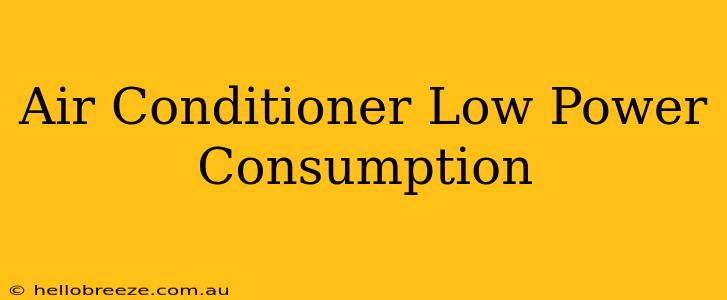Summer's heat can be unbearable, but the rising cost of electricity makes choosing the right air conditioner crucial. This guide explores the world of low power consumption air conditioners, helping you find the perfect balance between comfort and energy efficiency. We'll delve into the features to look for, energy-saving tips, and the best types of AC units for minimizing your energy bill.
Understanding Energy Efficiency in Air Conditioners
Before diving into specific models, understanding the metrics used to measure energy efficiency is essential. The most common metric is the Energy Efficiency Ratio (EER) and Seasonal Energy Efficiency Ratio (SEER).
- EER (Energy Efficiency Ratio): This measures the cooling output (in BTU/hour) divided by the energy input (in watts). A higher EER indicates greater efficiency.
- SEER (Seasonal Energy Efficiency Ratio): This is a more comprehensive measure, considering the unit's performance throughout the entire cooling season. A higher SEER rating signifies better overall efficiency. Look for air conditioners with high SEER ratings – the higher, the better.
Key Features of Low Power Consumption Air Conditioners
Several features contribute to a significantly lower energy consumption:
1. Inverter Technology: The Heart of Efficiency
Inverter ACs are the gold standard for energy efficiency. Unlike traditional on/off units, inverters adjust their compressor speed to match the cooling demand. This prevents unnecessary energy waste and provides more consistent temperatures. This smooth operation also leads to reduced noise.
2. Smart Features and Controls: Take Charge of Your Cooling
Many modern air conditioners boast smart features such as:
- Smart thermostats: Allow for precise temperature control and scheduling, optimizing energy usage.
- Wi-Fi connectivity: Enables remote operation and monitoring, allowing for adjustments based on your schedule and even integrating with smart home systems.
- Sleep mode: Gradually increases the temperature during sleep, saving energy while ensuring comfortable rest.
3. Energy Star Rating: Your Guarantee of Efficiency
The Energy Star rating is a valuable indicator of an air conditioner's energy efficiency. Look for this certification to ensure the unit meets strict energy-saving standards. This is a powerful signal to consumers and shows a commitment to reducing environmental impact.
4. Efficient Filters and Design: Keeping it Cool and Clean
Regular maintenance, including cleaning or replacing air filters, significantly impacts an air conditioner's performance and energy efficiency. A clean filter ensures optimal airflow, reducing the strain on the compressor and preventing wasted energy.
Types of Energy-Efficient Air Conditioners
Different types of air conditioners offer varying levels of energy efficiency. Some popular options for low energy consumption include:
- Window air conditioners: Compact and relatively inexpensive, these are good for smaller spaces.
- Portable air conditioners: Offer flexibility, but may not be as energy-efficient as other options.
- Split system air conditioners: Offer superior cooling and are generally more energy-efficient than window or portable units, particularly those with inverter technology.
- Ductless mini-split systems: Ideal for zoned cooling and offer great energy efficiency.
Tips for Reducing Air Conditioner Energy Consumption
Beyond choosing an energy-efficient model, here are practical tips to minimize energy usage:
- Regular maintenance: Clean filters and schedule professional servicing.
- Proper installation: Ensure proper installation to maximize efficiency.
- Seal windows and doors: Prevent cool air from escaping.
- Use window coverings: Block direct sunlight to reduce cooling load.
- Set the thermostat higher: Even a few degrees can make a difference.
- Utilize fans: Circulate air to improve cooling efficiency.
Conclusion: Cool Comfort Without the High Energy Bills
Investing in a low power consumption air conditioner is a smart move, both financially and environmentally. By understanding the features and metrics discussed above, you can make an informed decision and enjoy cool comfort without breaking the bank or unnecessarily impacting the planet. Remember, a little research goes a long way in saving you money and energy in the long run.

